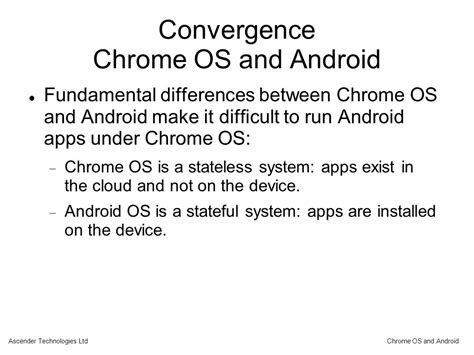In recent years, Google has been at the forefront of pushing the boundaries of operating system innovation. One of the most compelling developments is the potential convergence of ChromeOS and Android. This strategic move could redefine how users interact with technology, blurring the lines between mobile and desktop ecosystems. By incorporating the best features from both operating systems, Google aims to deliver a unified, seamless experience for users. However, this ambitious vision comes with its own set of challenges that need to be addressed.
A significant part of the convergence strategy involves embracing portions of the Android stack within ChromeOS. This includes utilizing the Android Linux kernel and Android frameworks, which promise to enhance ChromeOS’s functionality and performance. While this move has been praised for its potential to streamline development and reduce fragmentation, it also raises questions about how certain features and tools will be affected. For instance, how will existing ChromeOS applications adapt to this new hybrid environment?
Moreover, this convergence isn’t entirely unprecedented. The concept of integrating mobile and desktop environments has been explored by other tech giants such as Apple and Microsoft. Apple’s iPadOS aims to blur the lines between a tablet and a laptop, while Microsoft’s Surface devices are built to provide a seamless experience across different form factors. Google’s approach, however, stands out due to its emphasis on leveraging the robust ecosystem of Android apps while maintaining the security and simplicity of ChromeOS.
The discussion around virtualization is pivotal in this context. Google is currently experimenting with booting ChromeOS inside a VM on Android, which could potentially allow users to run a full-fledged desktop operating system on their Android devices. This is particularly intriguing given the success of projects like Samsung DeX, which has demonstrated the viability of transforming a phone into a desktop-like environment. However, Google’s implementation would need to overcome significant technical hurdles to provide a comparable or superior experience.
Another aspect to consider is the impact on development tools and environments. Developers have long relied on the flexibility of Linux-based environments offered by ChromeOS. As noted in the user comments, there is a concern that moving to an Android-centric stack could affect tools like Crostini and Crouton, which currently allow for a development environment within ChromeOS. Ensuring that these tools remain functional and effective in the new hybrid OS is crucial for developer adoption and satisfaction.
From a hardware perspective, the convergence opens up new possibilities for device innovation. There have been calls for more powerful Chromebooks equipped with advanced hardware specifications, such as increased RAM, higher storage capacity, and dedicated GPUs. The integration with Android could make it more feasible for manufacturers to produce high-performance devices that cater to both casual users and professionals. The ability to leverage Android’s extensive hardware support infrastructure could significantly enhance the capabilities of future Chromebooks.
Security is another critical dimension that Google needs to address. ChromeOS is renowned for its robust security features, including verified boot and sandboxing. Integrating Android’s stack must not compromise these features. In fact, it could offer an opportunity to enhance security further by incorporating Android’s advanced security mechanisms. The challenge lies in balancing the open nature of Android with the stringent security requirements of a desktop operating system.
Ultimately, this convergence could mark a turning point for Google’s operating systems. By creating a cohesive experience that integrates the strengths of ChromeOS and Android, Google is positioning itself as a leader in the next wave of technological innovation. The road ahead is undoubtedly challenging, but the potential benefits for users and developers alike make it a journey worth undertaking. As more details emerge, it will be fascinating to see how Google navigates the complexities and seizes the opportunities presented by this ambitious project.


Leave a Reply